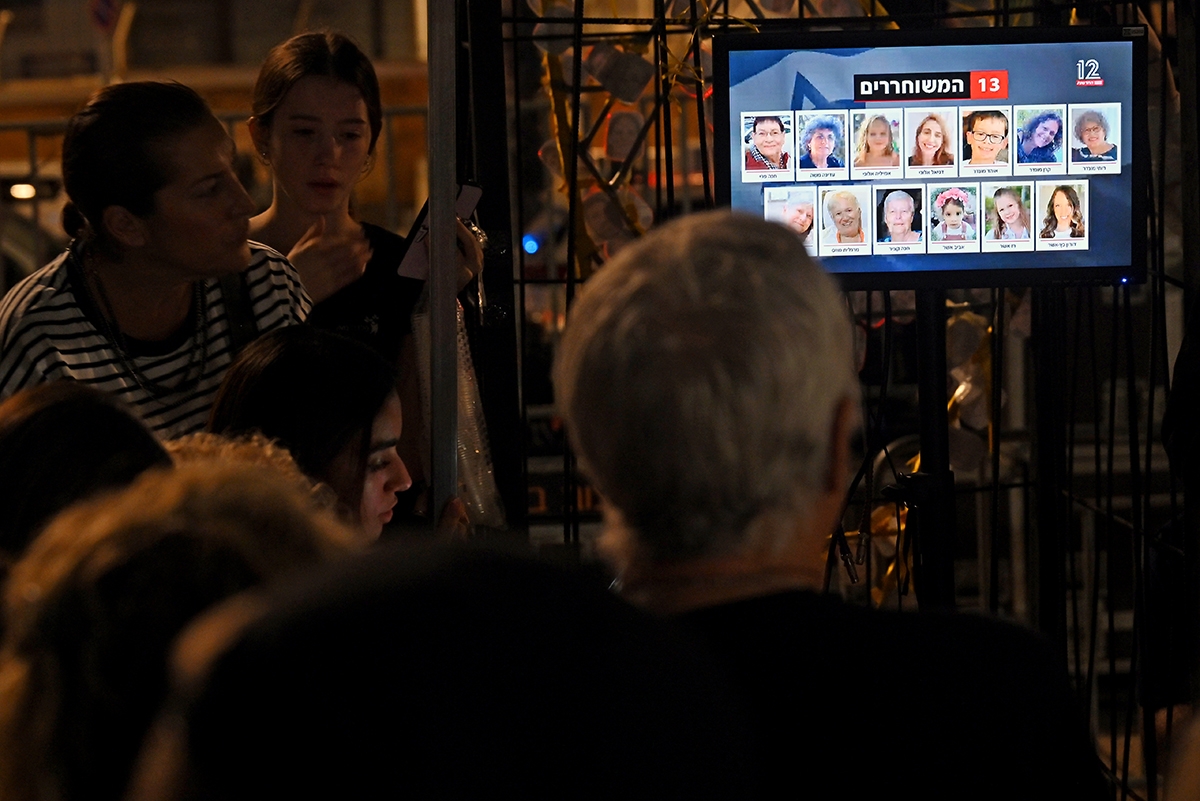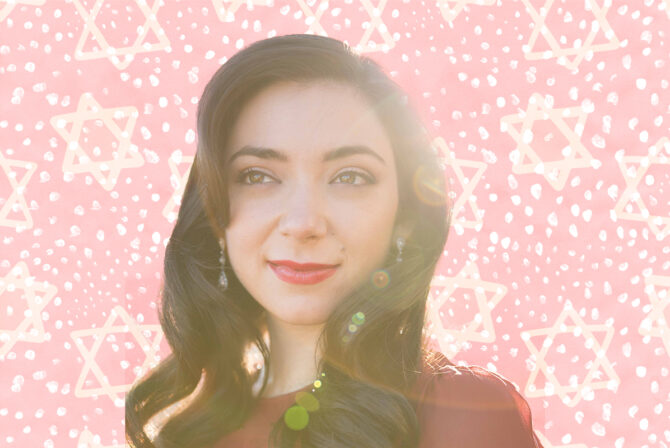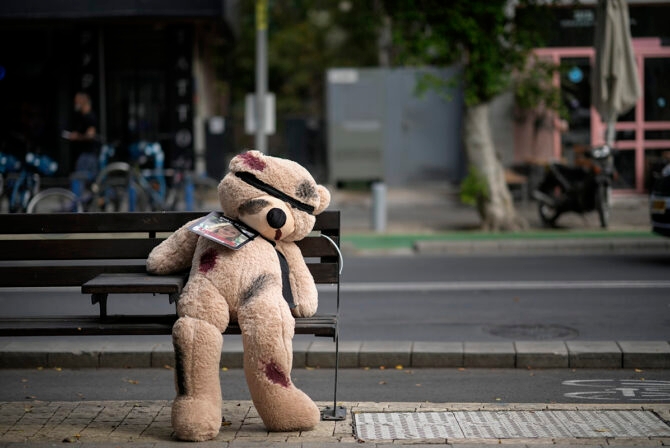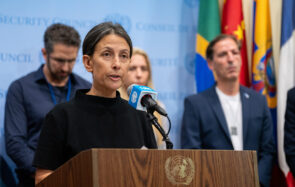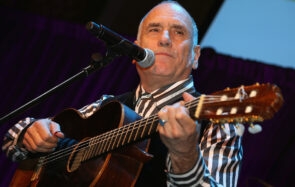A table laden with toys and coloring books was ready, a cushy corner full of teddy bears. On the helicopters meant to carry them to safety were colorful, kid-sized noise-canceling headphones. It didn’t look like any hostage exchange we’ve ever seen.
Four children, three mothers and seven elderly womenwere on their way to a nation waiting with bated breath and wet eyes. Along with them were 10 Thai workers and one Filipino worker, who helped tend to the people and fields of the kibbutzim. These hostages, the first to be released as part of a deal made between Israel and Hamas that coincides with the release of Palestinian prisoners and a temporary ceasefire, made the trek from Gaza back to Israel today. Their families had been notified and waited in special rooms in Israeli hospitals. IDF soldiers were given specific instruction for how to talk to and touch the children (never without consent unless absolutely necessary, and even then, clearly narrating the actions that needed to be taken to get the children where they were wanted, needed).
I’ve been crying — we’ve all been crying — at the images of the captives, their families and those still waiting across the country and gathered in a square in Tel Aviv. It’s actually a post from comedianRevital Vitelzon Jacobs,who has been unusually but appropriately raw throughout the war, that has stuck with me.
When the hostages come back, she wrote on her Facebook page, she hopes that they will be met only by their families and health professionals, the best ones in the world. “No politicians, not liaisons, not the representatives of the negotiation, not the media,” she shared. As a citizen of Israel, she and I, and so many of us, would be willing to forgo the images of the children and the mothers for the mere knowledge that they are surrounded by warmth, love, affection and familiar faces. “I don’t need a photo or an interview, just to know that they’re here,” she ended.
In the Tel Aviv square where families of hostages gathered they were singing “Hallelujah,” by Milk and Honey, a song that won the Eurovision in 19, a song of hope — “for what has happened and what hasn’t happened yet, hallelujah (praise God),” they chanted. For the first time in so long, smiles and excitement met the faces of those who have been twisted only with agony. The thought of those first hostages getting returned left hope for everyone in that square, not just the families of those crossing back to Israel, listening like so many of us for every update of their location. Even the faces in the Israeli newsrooms admitted to being filled with excitement.
“I’m excited, I’m scared, I’m jealous,” said one of the mothers of one of the children still in captivity.
Slowly, images have trickled in. We see their faces — Margalit Moses, 77, and Adina Moshe, 72, one waving heartily from an ambulance, a joy that she feels reflected in everyone. Her fellow kibbutz member recognizes her.
艾迪娜失去了她的丈夫,摩西说,他被杀了during the Hamas attack on October 7. He was a gifted farmer, born in Iraq, and people across Israel loved his vegetables, sold under the moniker Dod Moshe, Uncle Moshe, the way Old McDonald gets translated in the Hebrew version of the nursery rhyme song. Adina herself was a childcare provider; she helped raise many generations of kibbutz kids.
Margalit was a nature teacher, a woman who loves nature. Her ex-husband, who lived a few houses away from her, is still in captivity. His wife, Efrat Katz, was killed, and her son Ravid was taken, too.
Efrat’s daughter, Doron, 34, and two granddaughters, Raz, 4, and Aviv, 2, were released today.
Doron Katz Asher’s husband famously went back to the home where his wife and two children were captured in Nir Oz and found the little flip flops that belonged to his daughters. He said how worried he was about little Raz, who is old enough to understand everything that happened. Now he will get to hold his kids again, and comfort them in their trauma.
Daniel Aloni, 45, and her daughter Amelia, 6, have been released, too, recognized from the back by Daniel’s mother-in-law at first. Daniel was in a hostage video released by Hamas. Her sister Sharon, husband David, and their twin daughters are believed to still be held captive by Hamas.
The Munder-Zichri family is breathing a sigh of relief.A week after actor Jason Alexander shared the story of 9-year-old Ohad Munder-Zichri在囚禁庆祝他的生日,他的足总ther will be reunited with him, and with his wife, Keren Munder-Zichri. Keren’s mother, Ruti, is also coming back home, but her husband, Abraham, 78, is still held hostage. Her brother and Ohad’s uncle, Roee, was killed and that heartbreaking news will have to be relayed to him.
Perhaps the most traumatized family to be reunited with a loved one is the family of Hannah Katzir, 77. A few days ago, the Islamic Jihad announced that she died in captivity, yet she was one of the first 13 returned today. On Israeli TV, they called the false news of her death “psychological torture.” Her son, Elad, is still being held by Hamas.
Hannah Peri, 79, from Nirim, was also among the released. She is the only hostage released not from Nir Oz. She ran the kibbutz’s grocery shop and sewing workshop. In the morning of October 7, Hannah’s daughter got a message on WhatsApp with a picture of her mother and brother Nadav held by a Hamas militant with a Kalachnikov rifle. Nadav remains in captivity.
Yaffa Adar, 85, one of the oldest hostages, has also been released this Friday. An image of her, defiant and proud while being driven to Gaza, is still etched in many of our brains. Her son, Tamir, 38, remains behind.
Tomorrow, 10 more hostages will be released, hopefully up to 50, as the ceasefire holds. This is a day of bittersweetness — of celebration and still of grief, as so many are still left behind in uncertainty.
It is also the beginning of a long road for the captives. Yocheved Lifshitz, one of the captives released last month, is still walking around with sunglasses, her eyes still sensitive from the days she was underground. These children will have a lot of time before their eyes adjust again to light — and their lives will most likely be forever changed by what they endured in those underground tunnels and the unspeakable horrors of October 7.
We see the images, the first hugs with Israelis, but I, too, would give them all up for the knowledge that they are getting the comfort they need. We hope they are all enveloped in warmth, in familiar faces, and given the space to heal.
